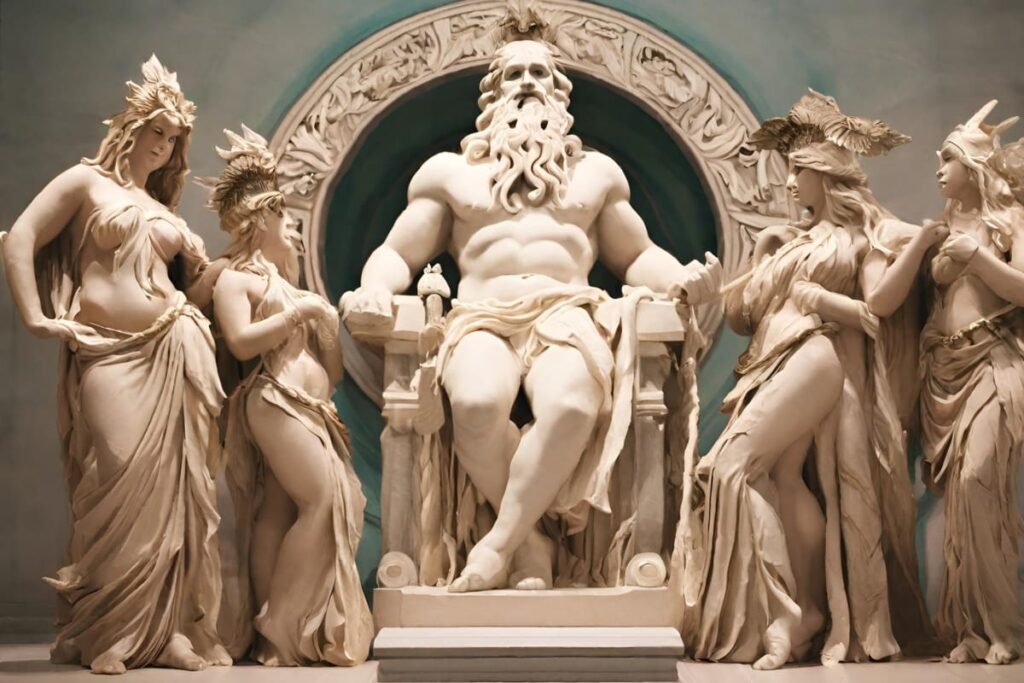In Greek mythology, the gods often engaged in various scandalous affairs that captivated the imagination of ancient Greeks. One such affair that stands out is the scandalous affair between Zeus, the king of the gods, and his sister, Hera. This illicit relationship had a profound impact on the mythology and history of ancient Greece, leaving behind an unforgettable legacy filled with drama, power struggles, and divine offspring. In this comprehensive article, we will delve deep into the scandalous affair between Zeus and Hera, exploring its origins, consequences, and lasting impact on Greek mythology and society.
Origins of the Scandalous Affair
The roots of the scandalous affair between Zeus and Hera can be traced back to their family tree. Zeus and Hera were siblings, both being children of Cronus, the leader of the Titans, and Rhea, a Titaness. The Titans ruled the universe before the gods came into power, and Cronus had overthrown his own father, Uranus, to become the ruler. However, Cronus was also warned that one of his own children would overthrow him, just as he had overthrown his father.
With this prophecy hanging over his head, Cronus decided to devour each of his children as soon as they were born to prevent his own downfall. However, Rhea, the mother of Zeus and Hera, managed to save Zeus by tricking Cronus and substituting a stone wrapped in cloth for him. Zeus was then taken to the island of Crete, where he was raised in secret.
As Zeus grew up and learned about his true destiny, he felt compelled to challenge his father and free his siblings who had been swallowed by Cronus. Zeus eventually succeeded in overthrowing Cronus and becoming the ruler of the gods. This victory marked the beginning of a new era and set the stage for the scandalous affair with his sister, Hera.
Consequences of the Affair
The scandalous affair between Zeus and Hera had far-reaching consequences, both in the realm of the gods and among mortals. For the gods, it disrupted the established hierarchy and power dynamics. Hera, as Zeus’s sister and later his wife, held a position of power traditionally reserved for the queen of the gods. However, Zeus’s numerous extramarital affairs caused Hera great suffering and jealousy, leading to constant tension between them.
These tensions often spilled over into the mortal world, impacting human lives and shaping the course of history. Zeus’s infidelity resulted in the birth of numerous demi-god offspring, who played pivotal roles in various mythological tales. For example, Hercules, the son of Zeus and a mortal woman, went on to become one of the greatest heroes of Greek mythology, undertaking the famous Twelve Labors and earning his place among the gods.
Furthermore, the scandalous affair between Zeus and Hera had a profound impact on the Greek pantheon of gods. The divine offspring of Zeus and other mortal women, known as Olympians, added new members to the already extensive lineup of gods. This expansion of the pantheon brought about new dynamics, alliances, and rivalries among the gods, shaping the mythology and culture of ancient Greece.
Legacy in Greek Mythology and Society
The scandalous affair between Zeus and Hera left an indelible mark on Greek mythology and society. It served as a cautionary tale of the consequences of infidelity and jealousy, reminding mortals of the potentially disastrous outcomes of such actions. The stories of Zeus’s affairs and Hera’s retaliations were shared among the Greeks, serving as moral lessons and entertainment.
Furthermore, the scandalous affair between Zeus and Hera also reflected the complexities and contradictions of human nature. The gods, despite their superiority and immortality, were not immune to the vulnerabilities and emotions that plagued mortals. This humanization of the gods made them relatable to the people of ancient Greece, allowing for a deeper connection and understanding of the divine and their actions.
In addition to its impact on mythology, the affair also influenced the societal norms and expectations surrounding marriage and fidelity. Hera, as the goddess of marriage, was meant to embody marital harmony and fidelity. However, Zeus’s actions challenged these expectations and raised questions about the sanctity of marriage. This paradox sparked debates and discussions among ancient Greeks, shaping their views on relationships and morality.
Conclusion
The scandalous affair between Zeus and Hera stands out as one of the most captivating and consequential stories in Greek mythology. This illicit relationship between siblings had far-reaching consequences, disrupting the gods’ hierarchy, shaping the mortal world, expanding the pantheon, and leaving a lasting impact on Greek mythology and society.
From the origins of the affair to its consequences and legacy, the story of Zeus and Hera’s scandalous relationship provides a fascinating glimpse into the complexities of Greek mythology and the human condition. As we delve deep into the scandal, we discover lessons on power, jealousy, morality, and the enduring influence of ancient Greek mythology on our collective consciousness.
